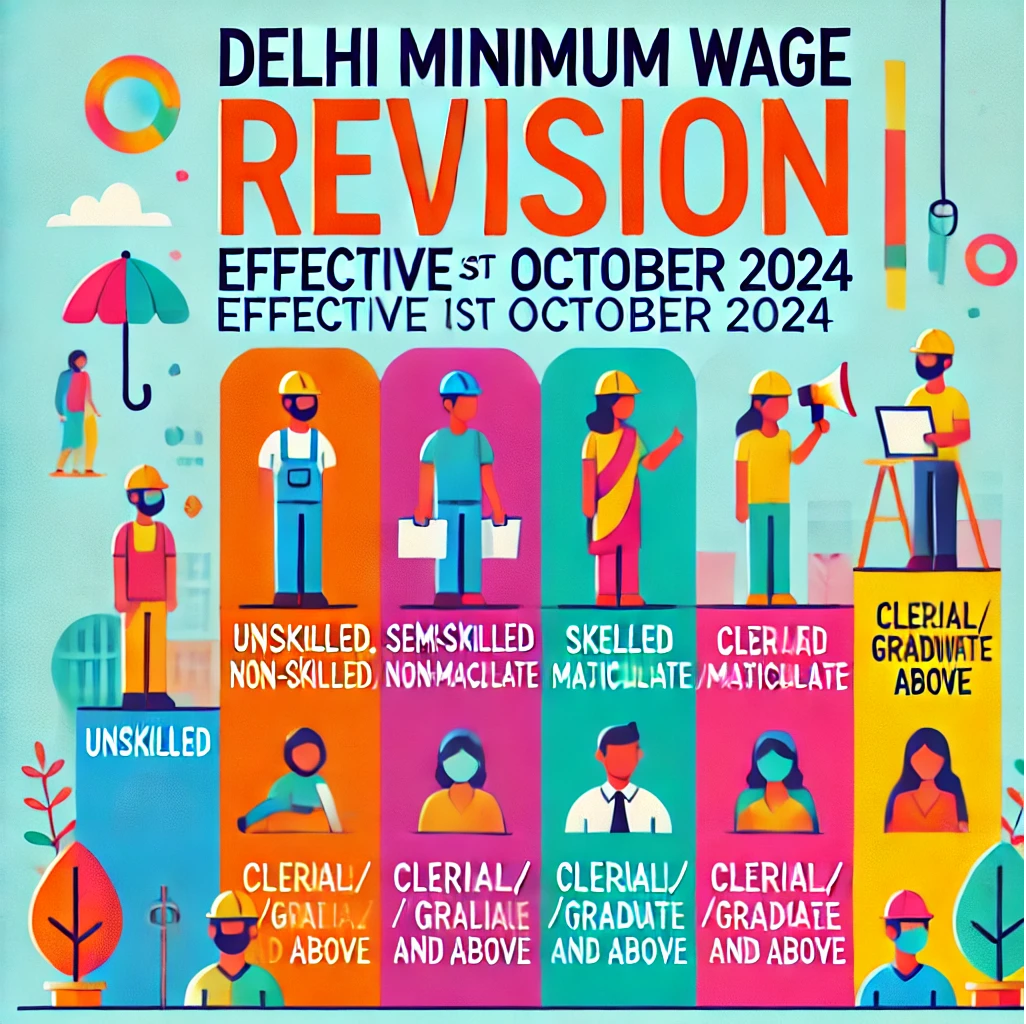
In a crucial move to keep up with rising living costs, the Government of the National Capital Territory of Delhi has revised the minimum wages for all scheduled employments, effective 1st October 2024. The wage hike applies to various categories of workers, including unskilled, semi-skilled, skilled, and clerical/supervisory staff, ensuring that their earnings reflect the increase in inflation as measured by the Consumer Price Index.
This revision not only boosts the wages of thousands of workers in Delhi but also promotes better standards of living in an economically dynamic city. The Dearness Allowance (D.A.) has been adjusted to reflect inflation, with new rates being implemented from October 2024.
Revised Minimum Wages Breakdown
Here’s a breakdown of the new wages effective from 1st October 2024:
|
Category |
Wages as on 01/04/2024 (₹) |
Dearness Allowance (₹/pm) |
Revised Wages (from 01/10/2024) (₹) |
Per Day Wage (₹) |
|---|---|---|---|---|
|
Unskilled |
₹17,988 per month |
₹78 |
₹18,066 per month |
₹695 |
|
Semi-skilled |
₹19,825 per month |
₹104 |
₹19,929 per month |
₹767 |
|
Skilled |
₹21,813 per month |
₹104 |
₹21,917 per month |
₹843 |
|
Clerical/Supervisory (Non-Matriculate) |
₹19,825 per month |
₹104 |
₹19,929 per month |
₹767 |
|
Clerical/Supervisory (Matriculate but not Graduate) |
₹21,813 per month |
₹104 |
₹21,927 per month |
₹843 |
|
Clerical/Supervisory (Graduate and Above) |
₹23,732 per month |
₹104 |
₹23,836 per month |
₹917 |
Dearness Allowance: Addressing Inflation
The Dearness Allowance (D.A.) is a vital component of this wage revision. It is aimed at protecting workers from inflationary pressures by adjusting wages to reflect the increase in living costs. For this revision, the All India Consumer Price Index (AICPI) for the period of January to July 2024 saw an increase of 2.41 points, bringing the index to 402.1.
This adjustment ensures that workers’ earnings remain aligned with the cost of living in a city like Delhi, where expenses such as housing, food, and transportation can quickly erode stagnant incomes. By revising wages twice annually—based on the AICPI—Delhi ensures that wages remain fair and equitable in an inflationary economy.
Implications for Employers and Workers
Employers in Delhi are mandated to implement these new wages from 1st October 2024. Failure to comply could result in legal consequences, including penalties, and may affect the organisation’s reputation and worker relations. Given that instances of document tampering have been reported, employers and workers are encouraged to verify wage details through the official Labour Department’s website.
For workers, this wage revision is a much-needed relief, helping to offset inflationary pressures that have been steadily rising over the past year. Workers in Delhi can now expect higher take-home pay, which will contribute to better living conditions and financial security.
Why Minimum Wage Revisions Matter
Minimum wage revisions are critical for the economic well-being of workers, especially those in the lower-income strata. Inflation can severely impact the purchasing power of workers, especially in urban areas like Delhi. These periodic revisions in minimum wages aim to protect workers from the adverse effects of inflation, ensuring their earnings keep pace with rising prices.
Furthermore, for businesses, fair wage policies can lead to better employee morale, productivity, and reduced turnover. It can foster a positive working environment, which ultimately benefits both the employer and the employee.
Conclusion
The revised minimum wage rates effective from 1st October 2024 represent a step toward greater financial stability for workers in Delhi. Employers should ensure timely implementation of the new rates, and workers are encouraged to verify that they are receiving the correct wages. The Government of Delhi’s commitment to adjusting wages in line with inflation ensures that the city’s workforce continues to earn fair wages despite the rising cost of living.
By maintaining this balance, Delhi sets an example for other regions in India to follow, reinforcing the importance of regular wage adjustments and inflation-based revisions.






